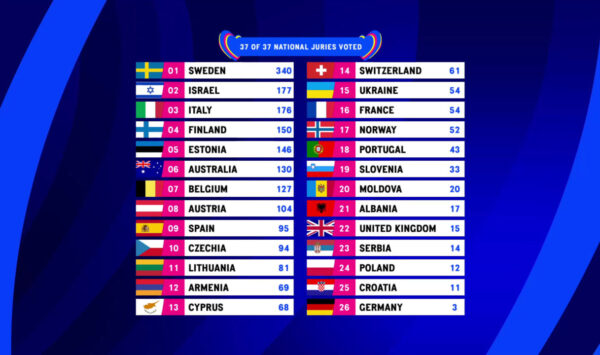The 2023 Eurovision Song Contest is behind us and the focus is already starting to set on the 2024 campaign. One topic has been at the centre of all debates: the voting system. Just like any year calls are made for this or the other system to be implemented. And just like any other year there shall be no consensus.
Articles and criticism have been flooding since the end of the Grand Final. A loud portion of the fanbase is extremely unsatisfied because their favourite and televote winner did not take the trophy to Finland. The usual drama and scandals have been well present since the Eurovision screens were turned off in Liverpool a bit more than three weeks ago.
Eurovision juries are not intrinsically bad. In recent times they have often balanced off televoting slips and ensured a relative fair recognition of quality acts. However, the current system can and must be further improved.
The voting system
Let’s analyse this with a cold mind. Yes, Sweden won thanks to the juries across Europe and Australia, but still placed second in the televote. An unpopular winner? I don’t think so. Furthermore, Loreen is the fourth winner in the last eight editions to take the trophy without placing first in the televote. In 2015 Il Volo from Italy conquered the audiences, but Måns Zelmerlöw from Sweden won the juries and the contest. In 2016 Ukraine won the contest with Russia getting the televote and Australia the jury vote. Similarly, in 2019 the Netherlands won the Grand Final despite Norway winning the televote and North Macedonia the juries.
So, if you consider that the EBU should scrap the juries simply because Käärijä did not win Eurovision, please think again. I have already underlined back in 2021 that the voting system has been under scrutiny and criticism since the creation of the contest. And just as in 2021, I do not think that the EBU will ever put forward a system which will create unanimity between the fanbase and the participating national broadcasters.
Should we have the televote deciding everything just as we saw in this year’s semi-finals? Should we go back to the dreadful diaspora and block-voting from the early 2000s? The main issue is not the system in itself, but rather how the EBU deals with it.
Improve the juries, don’t get rid of them
The current system introduced in 2016 with two different sets of points for the juries and the televote has the advantage of being more transparent than any other used in recent times. It is however not perfect and no system will probably ever be. The current most critical point is the appointment of judges by the national broadcaster and their respect of the contest’s rules.
According to the EBU judges must rate each performance according to four indicators: vocal capacity of the artist(s), performance on stage, composition and originality of the song and overall impression of the act. It is legit to ask ourselves whether Sweden really deserved the first place in the jury ranking according to these indicators. Finland certainly didn’t.
Nonetheless, the main question remains: how to improve the system? For example, how to impeach the Armenian judges to automatically put Azerbaijan last and vice-versa? How to demonstrate the unfair and biased voting from the juries and how to sanction them? How to make sure that every single judge is free from any political or personal link to other participating countries which might influence their voting? Or to make it short: how to avoid a repetition of the voting irregularity of 2022? The floor is open for debate.
The running order
Another element which could bring more fairness to all contestants is a completely random running order in all three shows. This would certainly entails some risks and might not please the TV production enthusiasts among us, but it would create a level playing field for all participants.
Isn’t it boring to be able to predict the results from the running order of the Grand Final? If a song performs second we all know it had qualified poorly from the semi finals and is given very low chances of success. But what about mixing all cards and – for instance – have Loreen perform in that unfortunate position? The fact that the EBU protects hot favourites by giving them so-called good numbers in the running order simply kills the competition.
We all know that modern Eurovision is Sweden-driven and this is likely to continue in the foreseeable future. Will we have further changes in the voting of Eurovision 2024, for instance with voting being split among age groups? Will we have directly qualified acts to the Grand Final with a second round of voting among all the remaining entries? I guess we shall wait and see if innovations from Melodifestivalen will continue to spill over to our beloved Eurovision. Most importantly, it is crucial to keep the topic of the voting system on top of all Eurovision debates. The credibility of the contest depends on it.




